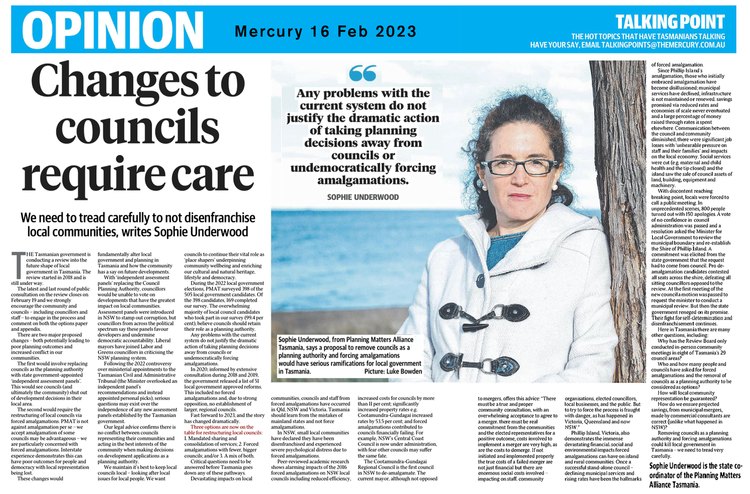- Submission
The Future of Local Government in Tasmania: Local Government Review
Media Enquiries
Sophie Underwood
PMAT State Director
sophie_underwood@hotmail.com
0407 501 999
Please share:
Submission Deadline Details
Future of Local Government Review – Stage 2 Options Paper closed 19 February 2023 at 12 midnight. See details in the ‘Reports’ section. Ensure you comment on both the Options Paper and the Appendix. https://www.futurelocal.tas.gov.au/publications/
Our key concerns/issues relate to:
A flawed consultation process with a lack of genuine consultation;
Councils must retain their role as a Planning Authority, ensuring local representation and accountability; and
forced amalgamations.
Removing councils as a Planning Authority and forcing amalgamations could kill Local Government in Tasmania and with it local representation, accountability and core services. It would appear that this is the intent of the Local Government Board. Given the poor track record of both forced amalgamations and the creation of planning panels on the mainland, this is an alarming position.
If amalgamations are to happen in Tasmania it is strongly recommended that the major elements required for successful amalgamations, as outlined in Section 5 of PMAT’s submission be adopted.

PMAT in the Media
PMAT Media Release, 16 February 2023: Scale of changes and dubious consultation prompts call for more community engagement on Local Government reform.
PMAT’s Talking Point: Changes to Council Requires Care, The Mercury, 16 Feb 2023 here.
PMAT’s Talking Point: Vital to keep planning matters local, The Mercury, September 23 2022.
Listen in to PMAT State Coordinator Sophie Underwood’s ABC radio interview with Leon Compton regarding the Local Government Review (1:08 mins), Tuesday 14 February 2023.
Effects of Removing Councils as a Planning Authority in NSW and replacing them with planning panels
How ‘unelected faceless men and women’ keep approving NSW developments, Sydney Morning Herald, August 15, 2021.
A case study of the effects of forced amalgamations on Philip Island, Victoria
Philip Island, Victoria, demonstrates the immense devastating financial, social and environmental impacts forced amalgamations can have on island and rural communities. Once a successful stand-alone Council – declining municipal services and rising rates have been the hallmarks of forced amalgamation.
Read about Philip Island’s forced amalgamation disturbing case study here and here.
A case study of the effects of the 2016 NSW forced amalgamation program
In NSW, small local communities have declared they have been disenfranchised and experienced severe psychological distress due to forced amalgamations.
Peer-reviewed academic research shows (see below) alarming impacts of the 2016 forced amalgamations on NSW local Councils including reduced efficiency, increased costs for councils by over 11%; significantly increased property rates e.g. Cootamundra-Gundagai increased rates by 53.5%; and forced amalgamations contributed to councils financially failing. For example, NSW’s Central Coast Council is now under administration; with fear other Councils may suffer the same fate.
Roadmap for “complex” council demerger revealed, Inside Local Government, 6 February 2023.
Recent empirical peer reviewed research in the scholarly literature on the effects of the 2016 NSW forced amalgamation program: Please see here the short summary on the findings of empirical research in the scholarly literature on the effects of the 2016 NSW forced amalgamation program. As outlined in the attached ‘it paints a damning portrait of the outcome of the municipal mergers’.
Fiscal outcomes arising from amalgamation: more complex than merely economies of scale by Joseph Drew, Dana McQuestin &Brian Dollery, January 2023.